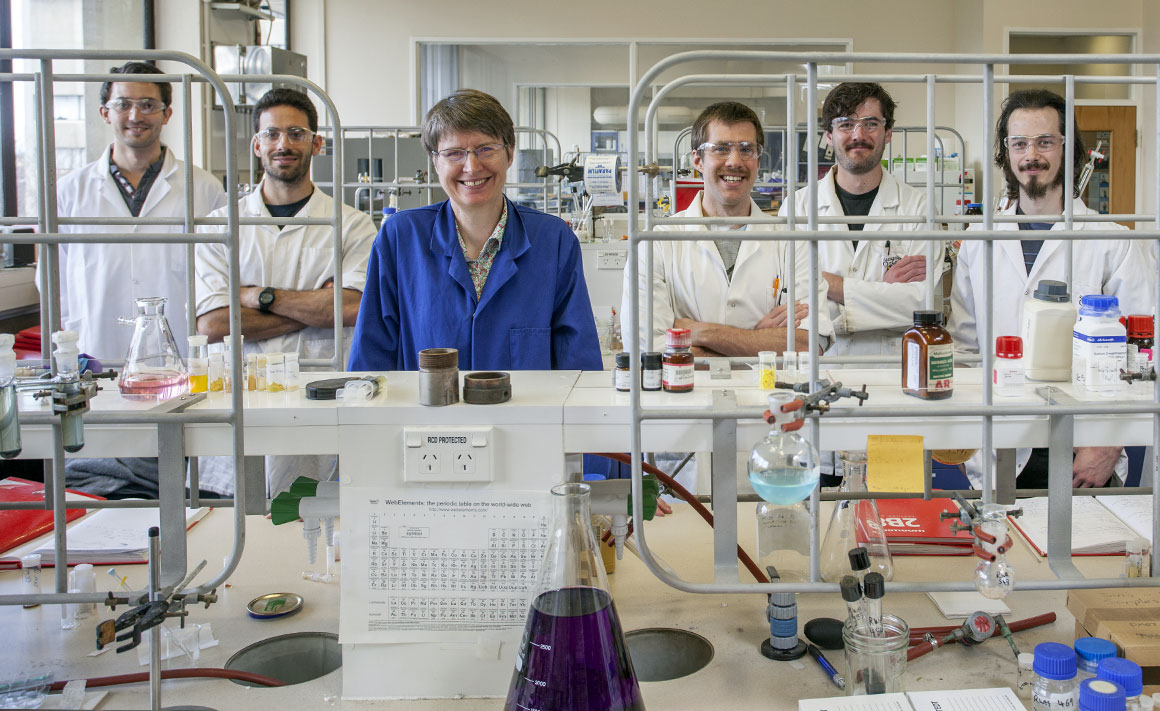
Specialising in designer molecules, 2015 Distinguished Research Medal winner Professor Sally Brooker looks at the small detail of the big picture.
International collaboration is a hallmark of the career of the University of Otago's 2015 Distinguished Research Medal recipient, Professor Sally Brooker (Chemistry).
Brooker is recognised as a world leader and innovator in inorganic chemistry research; she and her research team, known as “Brooker's Bunch”, specialise in designer molecules.
“We try to design and then build interesting molecules that have never been made before and have a range of potential applications, which is pretty cool,” Brooker enthuses.
One aspect of their work involves using catalysts to create polymers or synthetic materials such as plastics.
“The plastic pottle your yoghurt comes in is a polymer,” Brooker explains. “It comes from small molecules that are linked together in a very controlled way using a catalyst to make bigger, better molecules.”
She and her colleagues are collaborating with a London research team to explore the creation of polymers that incorporate and, hence, remove the greenhouse gas carbon dioxide from the air; or are made from renewable resources like corn, rather than from fossil fuels such as oil, using cheap, non-toxic catalysts such as zinc in the process.
Another major area of research involves constructing molecules that could eventually replace silicon chips in computers.
“If we want smaller, faster computers, instead of coming from a top-down approach – which is what is happening at the moment – shrinking the circuitry, chemists can make molecules which are way smaller and hope to build up from those molecules a smaller, more energy efficient computer system, which would be more like a brain,” Brooker says.
“What we are working on at Otago is making molecules that could act either as switches or memory components in that ultimate device. That is the big picture. We are never going to be responsible for assembling the 'brain' but we are trying to make a contribution.”
Brooker has collaborated with many scientists in Australasia, North America and Europe in pursuing her research.
“I have not been too bashful about saying to someone, 'Hey, we have got this really interesting molecule, this is what we know about it, this is what we think it would be cool to do, and you are the world expert in doing that, would you be interested?' and they go, 'Yeah, great, send it over'”
“Once the study has been done, sometimes the collaboration comes to a natural end because you publish the paper and you move on, but, in some cases, they become extended collaborations.”
She cites as one example her long-term collaboration with a German professor who has the necessary specialist testing equipment and expertise. “We are really good at designing and synthesising exciting molecules and she is expert at testing some of them.”
Brooker has produced more than 170 journal articles, many in collaboration with colleagues around the world.
Her international connections began while she was completing her PhD at Canterbury University and she met a couple of visiting German academics. One encounter led to a long-term collaboration, and the other to a crash course in German and a postdoctoral fellowship at Göttingen University, before she joined the staff at Otago in 1991.
Brooker has returned to Germany many times, including as a Humboldt Fellow in 1996, and as a visiting professor in 2004, 2007 and 2013. She has even met the German Chancellor, Angela Merkel, although, not in Germany, but in New Zealand, at a function in Auckland in 2014. Merkel has a doctorate in chemistry, worked as a research scientist before entering politics and wanted to meet local researchers.
In addition to her reputation as a researcher, Brooker is regarded as an outstanding trainer and mentor of postgraduate students and early-career researchers. Postdoctoral fellows have travelled from around the world, notably from Germany, to work with her, although she modestly deflects attention away from herself.
“One of the reasons they like to come here – beside the fact that New Zealand has this lovely green image – is that we have the advantage of speaking English and immersion in English for a year is helpful in terms of their careers. Most have returned to nice jobs in Europe, typically in big chemical industry companies.”
Brooker proudly plots the geographical spread of her former PhD students on a map of the world and delights in their professional progress: from an associate professor to a beer brewer.
Although her research is consumed by things as infinitesimal as molecules, which can be as small as a handful of atoms stuck together, the scientist who grew up on a North Canterbury farm refocuses while spending time on her farmlet.
“I often stop and think, 'Gee, those leaves are really clever things, doing heaps of really important chemistry that we chemists still cannot do benignly.' It's an inspiration.”
Funding
- Marsden Fund
- MacDiarmid Institute
- University of Otago